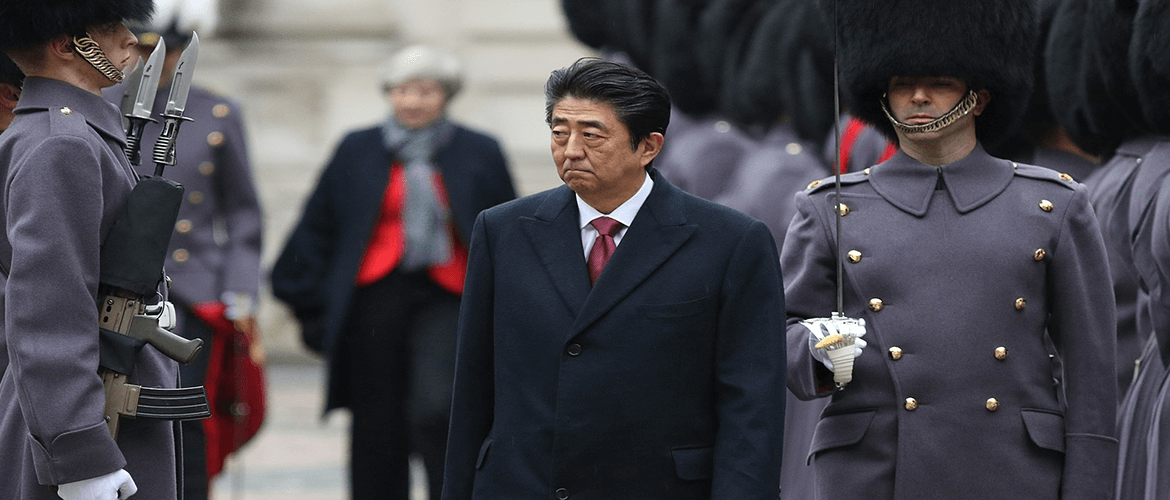Passing the Baton of Abe's Legacy
September 4, 2020 | Expert Insights
Japan’s Prime Minister Shinzo Abe has announced that he would be resigning due to health issues. This shocked even the Liberal Democratic Party of Japan, and a vote is due on September 14 to select his successor for the remaining year and a half of the present term. An inspirational leader, Mr. Abe brought in never-seen-before political stability to Japan. He did it through free trade deals with the European Union (EU) and by pushing for stronger relations within the QUAD. His fight with chronic ulcerative colitis has been a long one — it led to his resignation during his first term in 2007, and has now resurfaced. He will, however, continue as a lawmaker.Described as a conservative nationalist, he attempted to rebrand Japan, moving away from the “history issues” of its imperialist past, yet not as a revisionist, but as a believer that post-1945, Japan has a wholly new approach to constitutional democracy, pacifism, and internationalist purpose. His concept for revamping the economy, dubbed 'Abenomics', boasted of fine principles to get it back on track.He is, however, leaving in the midst of a pandemic, an escalating trade war between the U.S. and China, simmering conflict in the South China Sea, and with the economy in a recession. His successor has his work cut out for himself.
DIPLOMATIC AND ECONOMIC LEGACY
The Japanese economy has shrunk for three consecutive quarters, with inflation remaining well below the 2 percent target set in 2013 by Mr. Abe himself. Government debt is at a record high of more than 250 percent of the GDP. The Prime Minister and his cabinet also drew people’s ire for a late and insufficient response to the COVID-19.His three-pronged Abenomics was that of loose monetary policy, fiscal stimulus, and structural reforms. This scored initial successes — boosting growth, stocks and employment, propped up by a $ 2.2 trillion stimulus and monetary largesse from the Bank of Japan. However, regulations still need to be slashed, and the stimulus has failed to trickle down to the people. Growth suffered in 2019 due to the trade war between China and the U.S., and took a further hit this year with the pandemic. His biggest shortcoming was seen in his inability to usher in necessary structural reforms to boost productivity and coping with Japan's ageing and shrinking population.Mr. Abe was also a strong proponent of revising the pacifist Article 9 of the Constitution, which outlawed war as a means to settle international disputes involving the state. He was eventually unable to deliver on this. Japan has, however, reinterpreted Article 9, and passed new laws to assume a larger security role alongside the U.S., and also increased defence spending to develop Japan’s military capabilities. The first-ever National Security Secretariat was established in 2013 in the prime minister's office, which stands for Japan's "proactive contribution to peace", looking at increasing the Japan-U.S. partnership and working with partner states, especially Australia, India, and the ASEAN states. In diplomacy, Mr. Abe has seen more success, with both the initiation (2007) and the revival (2017) of the QUAD for security dialogue in the Indo-Pacific. He has also scored international free trade deals — one with the EU and one with the Trans-Pacific Partnership, a free trade agreement with the U.S. and 11 other Pacific Rim countries. Mr. Abe subsequently signed a bilateral trade deal with U.S. President Trump, albeit a truncated one.
NEXT SUCCESSOR'S ROLE
The new prime minister will have to deal with the recession and stifling the pandemic. Mr. Abe's successor might not have the option of postponing necessary economic reforms. An increasingly aggressive China would concern Japan. Balancing a strategy with QUAD and agreeing to join China to fund BRI projects if conditions are met, could be tricky. China is now Japan's largest export market. Though Japan's exports to China fell 25.3 per cent during the first half of 2019, due to a steeper drop in shipments to the U.S., China became Japan's largest trade destination for the first time. China is also Japan's largest source of imports. While Japan is also looking to limit Huawei’s influence following the U.S. move, it would be interesting to see how it navigates these murky waters.There are also the Tokyo 2020 Olympic Games that were postponed. Mr. Abe played a large role in bidding for the Games, and organisers hope he will remain involved despite his resignation. The Games was expected to run up a bill of $ 12.6 billion.
WHO NEXT?
There are three names out as successors to Mr. Abe — Yoshihide Suga, Japan’s top government spokesman and Mr. Abe’s long-time right-hand man; Fumio Kishida, foreign minister from 2012-17, who has been less supportive of the prime minister's push to rewrite Japan’s war-renouncing Constitution; and Shigeru Ishiba, former defence minister seen as Mr. Abe’s archrival, who is known to be a “defence hawk” and wants Japan to have stronger military capabilities. According to a survey conducted by Kyodo News, Mr. Ishiba has roughly 34 percent of the public's support, and Mr. Suga has 14 percent, the second-most popular choice. A Nikkei/TV Tokyo poll showed Mr. Ishiba with 28 percent support, followed by current defence minister Taro Kono with 15 percent. Mr. Suga was in fourth place with 11 percent.
Assessment
- Whoever steps up to be the successor has a lot on his plate. A forward-looking policy, with a focus on economic reforms and preventive measures for COVID-19 is top priority.
- Japan also needs a strong leader at a time when a neighbour as big as China is creating waves. While Japan is strongly aligned with the U.S., a careful balance needs to be struck between the two superpowers.



Comments